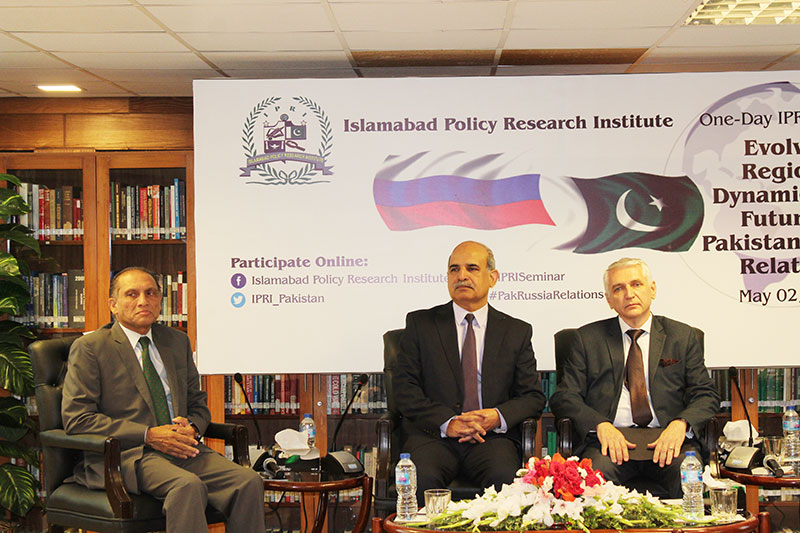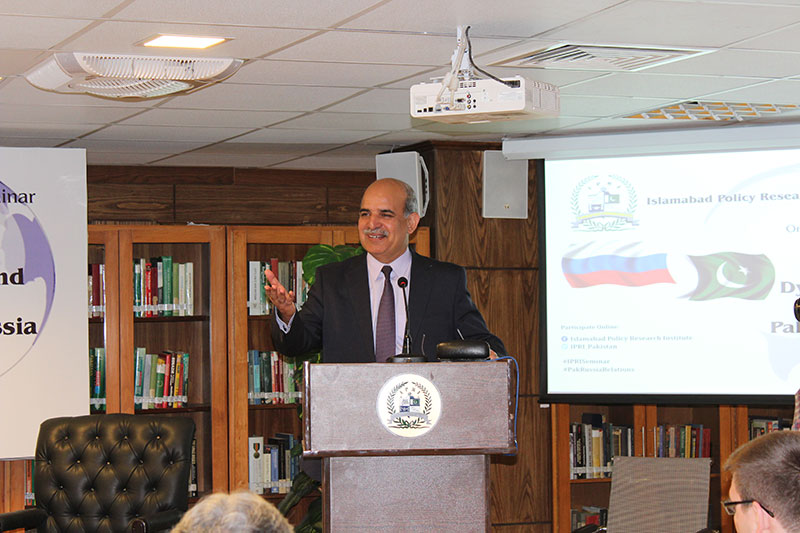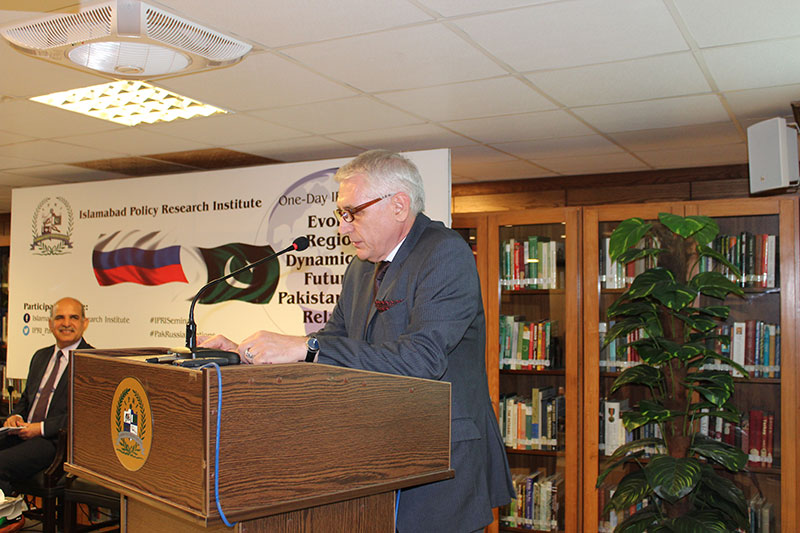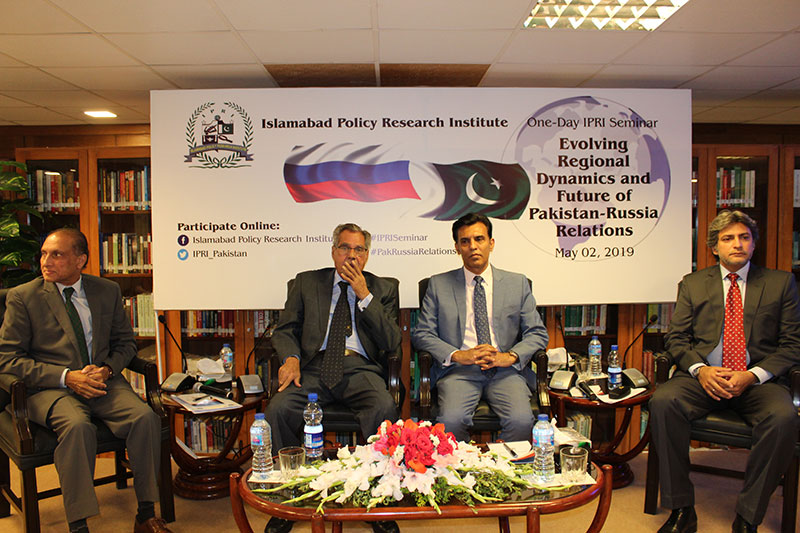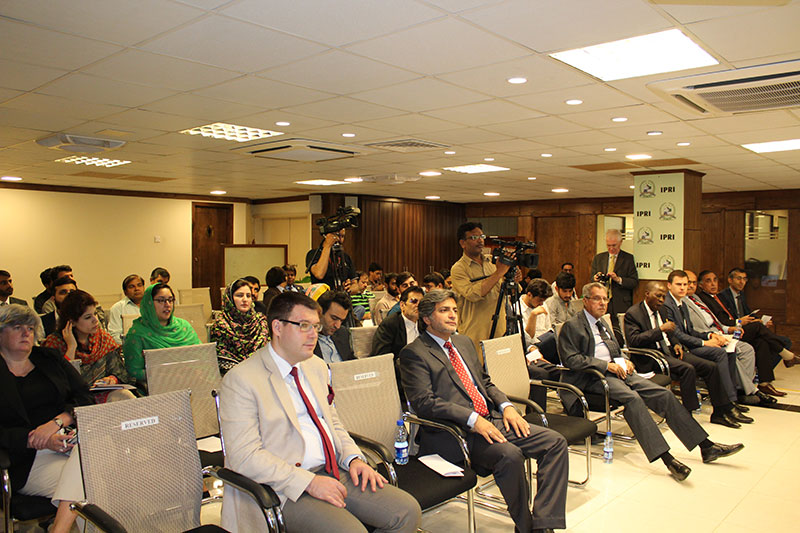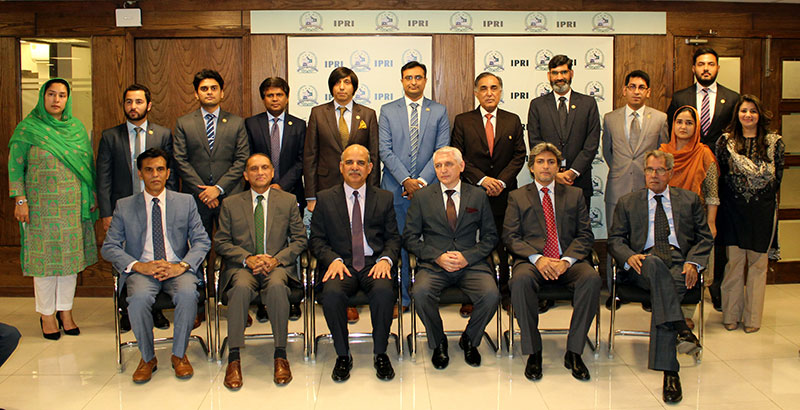Conference / Seminar / Webinar 17/05/2019
One-Day Seminar
on
“Evolving Regional Dynamics and Future of Pakistan-Russia Relations”
Islamabad Policy Research Institute (IPRI) organized a One-Day Seminar on “Evolving Regional Dynamics and Future of Pakistan-Russia Relations” on 02 May 2019, at the IPRI conference hall.
The discussion panel comprised of Ambassador Vice-Admiral (R) Khan Hasham Bin Saddique, President, IPRI, Dr. Sergei A. Baranov, Counsellor, Embassy of the Russian Federation, Islamabad, Ambassador (R) Aizaz Ahmad Chaudhry, Director General, Institute of Strategic Studies (ISS), Islamabad, Dr. Ahmed Ijaz Malik, Assistant Professor, School of Politics and International Relations (SPIR), Quaid-e-Azam University (QAU), Islamabad, Dr. Abid Qaiyum Suleri, Executive Director, Sustainable Development Policy Institute (SDPI), Islamabad and Ambassador (R) Mohammad Khalid Khattak, Former Ambassador of Pakistan to Russia.
Proceedings of the Seminar:
Ambassador (R) Khan Hasham Bin Saddique, President IPRI in his welcome address stated that the Pakistan-Russia bilateral relations have a background of realpolitik when both states pursued their diverging national interests in the days of the Cold War. As the era of the Cold War ended, following a period of deep silence, both states re-established their relations. It goes back to 2002 when Former President Musharraf met with Russian counterpart Vladimir Putin in Russia, which initiated the warming of relations specifically in the wake of the 9/11 attacks, the war against terrorism and the Afghan conundrum.
He further added that there are common areas of cooperation between Pakistan and Russia such as combating terrorism, bilateral trade, economic cooperation and stability in the region particularly in Afghanistan. He went on to say that any possible bilateral cooperation could be a harbinger of greater regional cooperation in the larger context. Moreover, he mentioned that Pakistan alongside India has been granted membership of Shanghai Cooperation Organization (SCO) in 2016 of which Russia is an integral part. From strategic perspective, Pakistan being at the crossroads of Asian sub-regions provides Russia and neighboring states access to Arabian Sea. Asia has now started to be seen as a hub of economic corridors and Pakistan offers lucrative economic opportunities to the regional countries and beyond. CPEC, a pilot project of Chinese Belt and Road Initiative (BRI) is a case in point.
He emphasized that initiatives like Turkmenistan–Afghanistan–Pakistan–India (TAPI), Central Asian Regional Economic Cooperation (CAREC) programme and ideas like South-South Cooperation can provide the foundational basis for greater regional homogeneity and integration. He also highlighted that Pakistan is an energy scarce country, whereas Russia has resources to offer which, if taken advantage of, can boost Pakistan’s struggling economy. More important, given Russian stakes in the stability of Afghanistan and Pakistan stance supportive of peace sustenance in that country, further chances of cooperation are manifold. He mentioned that modern day international relations are based on the paradigm of realism, Pakistan sees Russia as an important country in the region. There are opportunities available for both countries to explore and those must be materialized. Building of economic stakes in countries of interest is one plausible manner to sustain development and progress peacefully, he further added.
Dr. Sergei A. Baranov, Counsellor, Embassy of the Russian Federation, Islamabad underscored the recent developments taking place between Pakistan and Russia. He underlined that Pakistan is an important partner of Russia and its significance is determined by its positive role in regional politics, its influence in the Muslim world and its geo-strategic position. He further added that the potential of Pakistan-Russia partnership significantly advanced when Islamabad became a full member of the Shanghai Cooperation Organization (SCO) in June 2017. He also referred to the high level meetings held between Russian and Pakistani officials in a cordial and friendly environment where state representative from both sides discussed matters of mutual interests including bilateral, contemporary, global and regional issues, in the past. He stated that such meetings will continue to take place in the future for further strengthening of the bilateral relations.
He underlined that Moscow and Islamabad are united by the aspirations of a multi-polar world order, respect for international law and denial of attempts of interference in the domestic affairs of sovereign states. He mentioned that the interaction between both states have gained momentum in the past years with a significant visit of President of Republic of Tatarstan to Lahore and Islamabad in March 2017. In addition to this, the inter-regional cooperation was enhanced by signing of the agreement between the Government of Saint Petersburg with Sindh Government in cooperation of trade, economic, scientific and technical fields in October 2017. He further highlighted that there is very effective institutional mechanism of our economic cooperation, namely the bilateral inter-governmental commission on trade and economics. He also referred to the energy cooperation between Russia and Pakistan and stated that the inter-governmental agreement on construction of North-South gas pipeline from Karachi to Lahore was signed in Islamabad in October 2015. He mentioned that the bilateral trade turnover in the previous year has increased by 35.4 per cent up to US$ 732.4 Million mainly due to the growth of export by 60.5 per cent.
He highlighted that Russia has put forward a number of proposals to enhance cooperation in construction of off-shore gas pipeline, refining plants, crude oil and geological exploration, steel industry, railway tracks, medical and agricultural equipment, water and sanitation facilities and pharmaceutical products to the Pakistani market. He mentioned that the recent years have also witnessed intensification in military interaction in the form of exchange of defence delegation. He referred to a high level military meeting held between the Russian and Islamabad military delegations and also to the military exercises held between the two countries that has helped enhance the military lies overall. He mentioned that in order to strengthen the anti-terrorism potential, Russian supplied four combat transport helicopters MI-35 to Pakistan. He also identified that cultural, humanitarian and sports interactions are constantly being strengthened between the two countries.
Mr. Muhammad Nawaz Khan, Research Officer, IPRI gave an overview of Pakistan-Russia economic relations. He indicated that these relations have steadily evolved with huge scope which is evident during 1960s & 1970s in the field of economic, trade and investment. Following the brief period of post-Cold War era, time for fortunate opportunities is again ticking off offering both states to act rationally under their common strategic & economic interests and stances on matters involving regional & international sensitivities. He stated that present engagement between both countries in the backdrop of changing geopolitical and geo-strategic environment along with evolving inter-regional economic prospects and emerging threats to regional stability have steered Pakistan and Russia to start a new era of friendship.
While identifying the rationale for Pakistan-Russia emerging relations, he pointed out five major motives, which include:
- Pakistan relations with Russia are crucial due to Russia being a major regional & world power coupled with great economic potential and leading member of the SCO
- Pakistan requires foreign capital inflows and foreign direct investment and access to Central Asian reserves to revive its economy
- Pakistan can benefit from Russia in the field of energy, education, technology sharing, trade and infrastructure development
- Pakistan can be a competitive source for Russia in Agricultural and Textile goods
- Explore more venues in politico-economic & strategic engagements, and exploring prospective markets in South Asia to sustain Russian Economy
He mentioned that to open up the avenues of bilateral economic ventures, inter-governmental Commission for Trade & Economy was established in 1999. Furthermore, bilateral inter-governmental Commission on Trade, Economic, Scientific and Technical Cooperation was formed in 2009 which was the first step towards institutionalization of Pakistan-Russia economic relations. To stimulate commerce and promote mutual economic collaboration Pakistan-Russia business forum was formed in 2009 and later business council for promotion of trade with Pakistan was established in 2011. Recently, State Bank of Pakistan & the Central Bank of Russian Federation have joined hands in promoting financial cooperation through bilateral central banking cooperation agreement. Trade between both countries has also witnessed a gradual rise. In 1980s, trade volume stood around US$ 95 million while 2018 witnessed US$ 732 million trade between both states. The relations are further cemented under the inter-regional Economic Imperatives and Transnational projects.
Dr. Ahmed Ijaz Malik, Assistant Professor, School of Politics and International Relations (SPIR), Quaid-e-Azam University (QAU), Islamabad, while outlining the structure of his presentation, said that he shall begin by looking at strategic balancing and re-balancing in comparison to the post-Cold War era. Dr. Malik elaborated how the theoretical definitions of re-balancing, convergence and divergence in Pakistan-Russia relations and, implications for Pakistan have unfolded.
Comprehending Russia’s re-balancing and Pivot to East strategy, Dr. Malik was of the view that Russia’s strategy inherits its idea of “Greater Eurasia” from Yeltsin’s Eurasianism. Moreover, developing ties with Iran, Iraq, North Korea and engaging in conflict with Ukraine and Georgia, appeared confrontational to the US but these had been perceived as projection of Russian symbolic power. By signing Delhi and Bishkek Declarations, Russia appeared to project a commitment for a democratic multi-polar world order based on supremacy of international law and a strengthened United Nations (UN). Mr. Putin’s declaration that world will be predictable and stable only if it is multi-polar, suggested Russia’s objective of working to prevent the world from maintaining a unipolar order. Russia’s Pivot to Asia is resulting in a large-scale revamping of its Pacific fleet as its biggest naval asset. As part of an overall Russian military build-up initially projected to cost the US $600 billion, the priority for the fleet is the acquisition of small surface combatants in order to transform into a green water navy. New hunter-killer and ballistic missile submarines (or SSBNs) have been earmarked for the fleet.
Furthermore, Russian Ministry of Defence expects to develop a new super-carrier to rival the US’ Nimitz-class capital ships. It plans to introduce its Borei-class SSBNs from its newly upgraded Pacific base on the Kamchatka Peninsula. Its six new Yasen-class guided missile submarines are expected to join the naval fleet. Similarly, creating a Free Trade Area EAEU and ASEAN is expected to lead to Eurasian integration the post-Soviet space, but also as an integral part of the global economic architecture. A strategically important initiative in second ASEAN-Russia Summit (2010) was the agreement to explore ways to coordinate the two emerging mega-regional communities: the Greater Eurasia is expected to result from closer cooperation between the EAEU and the SREB project, with the institutional backing of the Shanghai Cooperation Organization; and Asia’s Regional Comprehensive Economic Partnership (RCEP).
Dr. Malik further said it is likely that Asia’s oil imports by 2035 may equal OPEC’s entire current production and Russia expects to meet that demand. The first major result from Russia’s energy pivot came in 2014 with an increase in oil supplies to China. Russia expects to meet Asia’s oil and energy needs. Another important area where Russia is seeking to compete for energy is in coal. Russia plans to quadruple coal output by 2030, and is building two new coal ports on its Pacific coast, which will be expected to provide 40 million tonnes annually.
International North–South Transport Corridor (INSTC) which was initially sponsored by Russia, India and Iran and later joined by (12) other Eurasian countries. INSTC has been regarded as at least an alternative and at most a rival to the Belt and Road and CPEC, in particular. The relationship between Russia and China is not strategic or directed against the US. Indo-Russian relations are less robust than outward appearances. Deals over arms sales and joint projects on military research and development are frequently delayed by the Russian side. India appears to lay greater priority to its strategic alliance with the US. India’s leaning towards the US especially since George W. Bush’s second presidential term opened up prospects for trade in nuclear materials. Russia will manage its dual relationship with India (which appears to have an inclination towards the United States in recent years); but perhaps also plans to compete with the United States; and expecting to rise as a regional strategic actor.
In addition to balance by allying with Russia; China appears to have developed a national policy with priority to increase its geo-economic power which is pushing the US to further expand strategic global influence. Russia’s choices of multilateralism comprise great power management, polycentrism, multi-regionality, promotion of global democracy and dialogue of civilizations. The US-India strategic partnership declared through the bilateral civil nuclear deal in 2008, India’s access to the Nuclear Suppliers Group (NSG) and greater involvement in Afghanistan has created security concerns for Pakistan.
The notable features in bilateral relations included the lifting of the arms embargo by Russia on Pakistan in 2014 and selling of SU-35 weapons. In 2016 and 2017, bilateral military exercises ‘Friendship Drills’ began despite protests by New Delhi. This partnership was tested after the US Afghan policy released on 21 August 2017 which unduly blamed Pakistan and called for a greater Indian role in Afghanistan and then suspending almost all security aid to Pakistan. Russia was among the first countries to publicly support Pakistan and called ending diplomatic pressure on Pakistan.
The year 2018 witnessed a considerable growth of Pakistan-Russia bilateral economic relations. Trade between the two countries currently totals $520 million a year. Recently, Russia has made agreements with Pakistan to uplift arms embargo, sold Mi-35 attack helicopters that have been delivered, and planning to negotiate the deal with Pakistan for SU-35 and SU-37 fighter jets. Moscow invited Pakistan to proposed peace talks on Afghanistan. Russia supports Pakistan’s accession to the Nuclear Suppliers’ Group. Accession of both Pakistan and India to the Shanghai Cooperation Organization in 2017 further signifies the importance of Pakistan as one of the pivotal states. Russia and Pakistan have agreed on issue of counter-terrorism.
In the post-Cold War era, the US’ extension of its alliance across the globe can be traced to the notions of off-shore balancing and sub-imperialism. While strategic alliance with India after the nuclear deal may be regarded as contributing to US’ off-shore balancing in response to the Chinese and Russian influence in South Asia; the economic alliance with India appears to project it as a sub-imperial state, which may be classified as a regional capitalist state.
While speaking on “Scope for Economic and Security Cooperation in Bilateral Relations,” Dr. Abid Qaiyum Suleri, Executive Director, Sustainable Development Policy Institute (SDPI), Islamabad said that Russia is currently 15th largest economy in the world. Russia’s population in 2018 was recorded at 144 million. The country hosts 6.3% of global oil and 18% of global natural gas supplies.
He further said that the Eurasian Economic Union (EEU) provides for free movement of goods, services, capital and labour of which Armenia, Belarus, Kazakhstan, Kyrgyz Republic and the Russian Federation are the member states.
With the start of the Ukraine crisis and the first round of sanctions imposed on Russia by the US, Canada, Australia and the EU amongst others; President Putin announced a turning point in Russia’s foreign policy, calling it the ‘Pivot to Asia’. The Russian government under this policy seeks to increase Russia’s integration with Asia, for achieving mutually advantageous economic ties, developing eastern Siberia in particular, attracting considerably more investment and high technology into Russia, bolstering the Moscow’s diplomatic influence on critical Asian issues, raising Russia’s profile in Asian regional organizations, and promoting multi-polarity.
A Memorandum of Understanding (MoU) has been signed on August 10, 2017, between the Inter-Rao and Himmash Apparat and KPKOGCL, regarding the oil-refinery in Kohat district. Pakistan and Russia have already signed a governmental agreement to build the north-south LNG pipeline. Russia has announced that Pakistan-made footballs will be used for FIFA events. Joint ventures are expected in sport industries. Inter-Rao has also expressed interest to invest in some key water and power sector projects, including the 7,100MW Buji, 52MW Nauseri, 2,800MW Yulbo, and 2,200MW Tangus projects.
While outlining strategy for Pakistan, he said that focus must be on value chain integration with Russia, particularly in the following sectors of surgical instruments, cotton-based clothing, fisheries, citrus, oil and gas and its interest may also be solicited for SEZs.
While concluding his presentation he recommended that Pakistan should enhance people-to-people contacts, overcoming language and visa barriers, increase media and academic exchanges, promote Pakistani products in Russian markets and collaborate with FPCCI to highlight prospects for Pakistan in Russian markets
Every aspect of Pakistan-Russia relations have been covered except one: Afghanistan, said Ambassador (R) Mohammad Khalid Khattak, Former Ambassador of Pakistan to Russia. While speaking on the topic, “Russia and Afghan Question: The Avenues of Cooperation between Pakistan and Russia,” he asserted that the Afghanistan problem is still there with no early solutions. While talking about Afghanistan, one needs to look a bit into the history, psyche, and mind of both Russians and Afghans. Without understanding these aspects, no clear conclusions can be reached.
Amb (R) Khattak said that Russia is a security state. For hundreds of years, Russia has interposed between Mongols and Europeans. It was because of the interposition of Russia that Europe was saved from these Asians. For another couple of hundreds of years, Russia received threats from the West. There is one thing very interesting about these security threats. Every military setback in Russia has not only led to the change of the government, but also the order. It was the defeat of the First World War, which resulted in the takeover by the Bolsheviks. It was a setback in Afghanistan that, to some extent, led to the change of order in Russia and in that region. A number of people think that the Soviet Union, perhaps, imploded because of economic conditions, that may be true, but partially. By fact, it was the Russian Federation Republic that revolted against the Soviet Union.
In 1992, the Commonwealth of Independent States (CIS), a kind of successive structure – not as strong as the Soviet Union, came into existence. And if Russia has to opt between security and economy, it would definitely go for security. Russians have history of not only fighting war but suffering and sustaining them.
For instance, when the revolution in Iran took over and Tehran Embassy was taken over by leftist students and leaders led by “Mujahideen-e-Khalq”. These young men and women were not fully controlled by even Khomeini. They were not releasing the American hostages as well. So, there was an attempt to release these hostages. The choice for the Soviet Union at that point was simply, either to confront US inside Iran or to play position itself to stop its fallout in the rest of the region, particularly the Central Asian Republics. Therefore, security was the main reason for Soviet Union’s intervention in Afghanistan.
As far as Afghanistan’s internal politics is concerned, much can be said about it. Firstly, Afghanistan has always faced two problems which are still prevalent. Afghanistan is a tribal state that came into existence in 1747. And its transformation from a tribal state to a national state is not easy. Secondly, Afghanistan came into existence without any defined frontiers or borders. It was a state without frontiers. In 1887, it signed the “Treaty of Panjdeh” near Caucus with Czarist Russia and demarcated its borders. In 1892, Amir Abdul Rehman, statesman as he was, signed the treaty of the Durand Line with the British India. The reason behind the treaty was that the British could again go for a forward policy.
Afghans and Russians have one thing in common, both like strong leadership. Now, presently, what are the wishes of the international community regarding peace in Afghanistan? If Afghan led and Afghan owned solution could be found, what was international community doing for the last forty years? Why this mantra has been repeated over time? In this current situation, the outside/extra-regional powers have to do the basic work which must be equally adaptive to the national framework. Only when a national format will be in place as a foundation, a regional and international arrangement can be built. For instance, Moscow format was the one format meant to bring Afghans together, given major issues reside with Intra-Afghan dialogue at the moment.
Ambassador (R) Aizaz Ahmed Chaudhry, Director General, Institute of Strategic Studies (ISS), Islamabad stated in his concluding remarks that the United States under Donald Trump through security documents (National Security Strategy and National Defence Strategy) have identified both Russia and China as its competitors. It is believed that a new Cold War is emerging where Russia and China are reorienting to new alignments for a bigger stake in the World Order. He further mentioned that the understanding of Russia and the US on Arms Control is collapsing and that has given impetus to arms race not just between the major powers but also in various regions of the world including South Asia. He also highlighted another very important development which US is embarking on Indo-Pacific strategy. For the first time, India is being projected by the US as a regional power in the Indian Ocean and extra regional-power in the Pacific Ocean for a role that the US believes it can play and should play in countering China.
He further stated that these are far reaching developments that also impact Russian decision makers. Russia has taken a lead on security issues and China has taken a lead role in the economic integration of Euro-Asian landmass. Russia and China are much closer today as they ever were in the past. In the regional context, Russia is re-asserting itself in the Middle-East. In South Asia, while the US is deepening partnership with India, Russia has continued to maintain its relation with India. He highlighted that in evaluating Pakistan’s relations with Russia and India’s relations with Russia, it should not be treated as a zero-sum game. Alliances in the contemporary period are issue based where allies on one particular issue can be rivals on another issue.
He underlined that warming up of relations between Pakistan and Russia began in this decade, especially in 2014 when Pakistan-Russia defense cooperation agreement was signed. However, it is also a reality that economic cooperation did not keep pace with that spirit which Russia and Pakistan was warming up to each other. He underlined various reasons for warming up of relations between Pakistan and Russia. It is evident that the United States is tilted heavily towards India and consequently, Russia also wants to have a balanced approached towards South Asia. He mentioned such approaches as multi-vectored pursuits taken into account in order to balance the situation. Secondly, Russia felt Pakistan could be a prospective market for Russian military equipment as well as investments.
The third reason of warming up relations is the situation in Afghanistan. Both Pakistan and Russia are convinced that peace and stability in Afghanistan would be in the interest of the region. Russians also believe that Central Asian states will be impacted negatively if instability in Afghanistan continues. Another reason he mentioned was initiation of CPEC which can provide easy access to Russia and Central Asian states in order to pursue their economic agenda. However, the relations have not grown up that fast as expected. He pointed out that India remains a limiting factor in Pakistan-Russia relations as Russia does not want to completely shift away from its traditional ally, with which it still has robust economic and defense relations.
Major Conclusions/Recommendations:
Following are the major conclusions and recommendations:
- The ‘Look East’ Policy announced by President Putin underscores the importance of the Asia-Pacific region for Russia. Russia aims to diversify its market portfolio for its military hardware, industrial goods and energy products. As a country of more than 200 million people, Pakistan presents an attractive market for Russian goods and services. Both countries should work diligently to reap the benefits of this opportunity.
- Both, Pakistan and Russia face a common challenge with regards to the situation in Afghanistan. Both countries are apprehensive of security challenges emanating from Afghanistan seeping into their countries. This common threat has provided impetus to strengthening the relationship between the two countries. To this end, increased cooperation in the fields of counter-terrorism and organized crime is a necessity.
- Pakistan and Russia enjoy robust military relations. Both countries participated in a joint exercise in 2017, known as Druzba (Friendship in Russian language). Later on, another set of joint exercises took place in Karachi-Cherkess in Russia. Russia also lifted arms embargo to Pakistan in 2014. Pakistan should further this momentum and seek Russia’s assistance in acquiring a nuclear submarine.
- Pakistan is part of Russia’s extended neighborhood, thus, in order to counter the security challenges faced by both the countries in the region, close military interaction and intelligence sharing is imperative. To this end, direct cooperation between Collective Security Treaty Organization (CTO) and General Headquarters (GHQ) is recommended.
- Pakistan’s relation with Russia should not only be seen from the lens of Indo-Russo relations. By doing so, it limits the scope of the relationship to mere security related issues and ignores the vast opportunities in other areas. To make this relationship more broad based, both countries should endeavor to understand each other’s history, psyche and culture.
- In the economic front, Russia is currently the 15th largest economy of the world with an almost $131.4 billion trade surplus. Pakistan cannot match Russia on any economic indicator such as GDP per capita, annual growth rate or GDP per capita. However, this should be seen as a learning experience by Pakistan to improve its own economic performance.
- In order to improve economic ties, Russia and Pakistan should work to eliminate the current counter financial credit claims that exist between both the countries. It was also suggested that Pakistan needs to improve its ease of doing business. For instance, it was mentioned that one of the key reasons behind why foreign investors ask for government guarantees is because of the legal and bureaucratic bottlenecks in the system.
- The long term China Pakistan Economic Corridor (CPEC) plan is not funded. Pakistan will have to mobilize its own resources or seek assistance from partner countries. To this end, Russia could play a constructive role. Pakistan should consider establishing a currency swap agreement with Russia to reduce reliance on dollars. Furthermore, Russian investors could be asked to buy Russian Rubles in Pakistan.
- Pakistan’s top exports to Russia include citrus, leather garments, surgical instruments, rice, and sports equipment amongst others. However, there remain potential sectors in which Pakistan could export to Russia. These include trousers, sugar cane, footwear, confectioneries, paper/paper board. Pakistan should work to tap these markets effectively.
- However, it is important to rationalize expectations because Pakistan’s crippling economy and sanctions on Russia by the West limit the level of cooperation between the two countries. As it stands, Pakistan does not have the purchasing power to buy defense equipment from Russia and the latter is not in a position to provide loans to the former as a result of the US-backed sanctions on Russia.
Disclaimer: Views expressed are of the speakers and are not necessarily reflective of IPRI policy.

